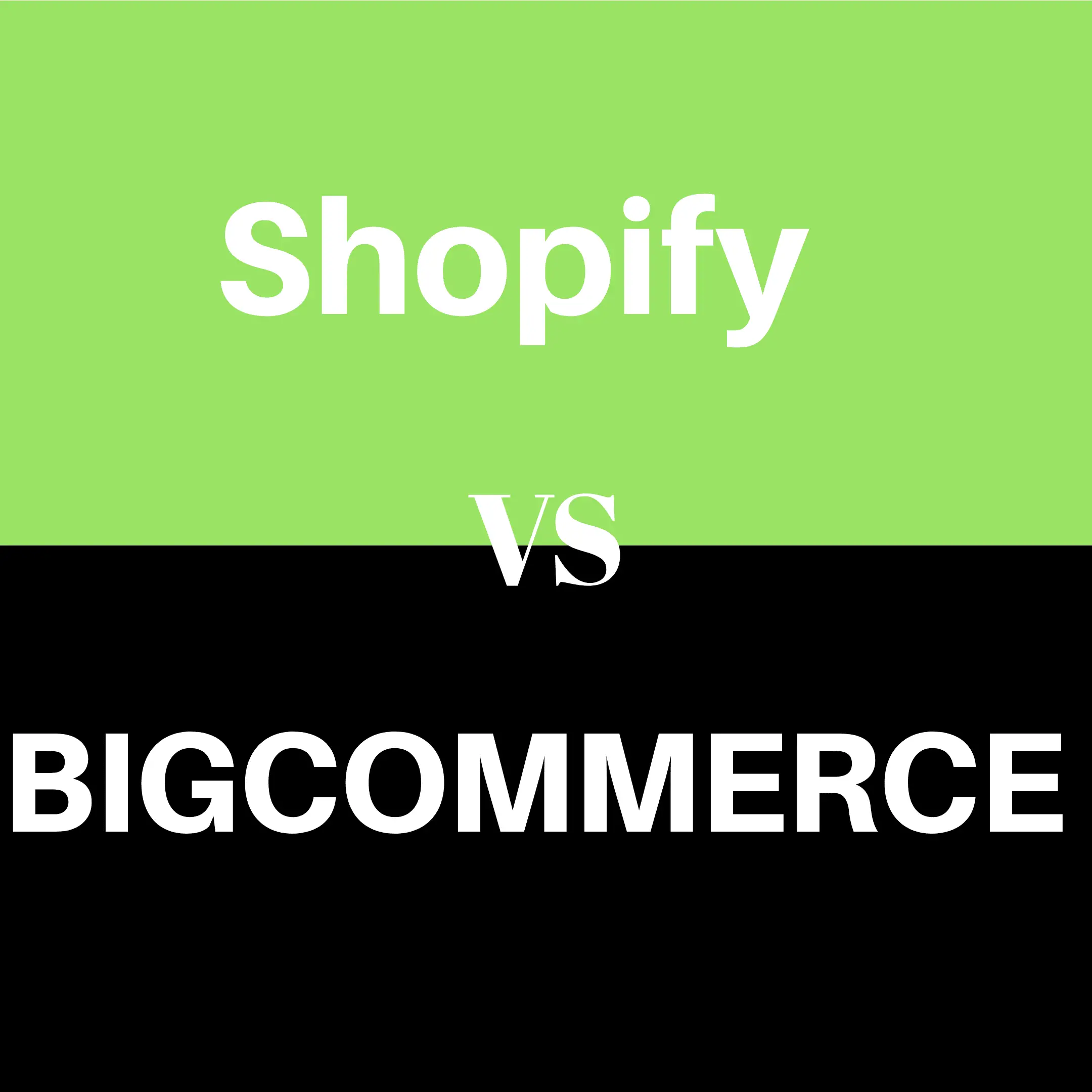
Selling online is no doubt one of the best ways to money online in this present time. A lot of people who are thinking of making money online are seriously considering E-commerce as one of the best ways to get there. According to Statista, In 2019, retail e-commerce sales worldwide were 3.53 trillion US dollars and e-retail revenues are projected to hot to 6.54 trillion US dollars by 2022. Shopify Vs BigCommerce is a common comparison potential merchants make when thinking of the best E-commerce platform to launch their online store.
Both are robust and popular e-commerce platforms most online store owners use. Interestingly they are all in one e-commerce platform – meaning that all you need to kick off is already done for you.
The stress of hosting your store, security, and backups, updates, search engine optimization, and coding has been taken care of.
That makes it suitable for a beginner who has no coding skills and wants a flexible, convenient platform to set up an online store, sell products, and make money.
Even at that, some people are still confused about which of the platforms to settle for. Some often ask ‘ Shopify Vs BigCommerce, Which is should I go for? ‘ I welcome you to this ultimate guide where we will compare in detail Shopify Vs BigCommerce.
The goal is to guide you towards making an informed decision. Your success in the e-commerce business largely depends on the platform you use. That’s why you have to make a wise choice.
This piece will factor in the following points as it concerns Shopify and BigCommerce:
- Integration
- Ease Of Use
- Dropshipping
- Themes
- Uptime
- Transaction Fees
- Customer Support
- Pricing Plans
- Pros and Cons
But before we dive into these points above, Let’s run an overview of Shopify and BigCommerce with some of the key features they have.
Shopify Vs BigCommerce: Overview
Shopify is an all-in-one robust e-commerce platform where you can build your own online store. It is designed to help you start, run, and grow your business. It powers over 1,000,000 businesses worldwide. Shopify has awesome features that make it easy for you to run your e-commerce business successfully.

It has over 70 professionally designed themes which makes it easy for you to customize your website. As a website builder, you can host your website on this platform. A full-featured content management system is attached to your online store.
In the second quarter of 2020, Shopify made a revenue of $714.3 million. 71% of the revenue came from new stores that were opened under the period in review.
Some of the key features of Shopify are:
- Unlimited bandwidth which doesn’t charge you base on the number of visitors to your store.
- Shopify has a shopping cart that is built into your online store. This makes it easy for your customers to shop in your store while on the go.
- It supports SEO practices which are to ensure that your potential customers find your store easily on search engines.
- Compatible with Google Analytics which makes it easy for you to monitor the behavior of your customers in your store.
- Access to CSS and HTML which makes it easy to customize any aspect of your online store.
- It integrates with apps like Oberlo, Order Printer, Inventory Source, Ordoro, ecomHub, Amazon channel, Stocky, GetResponse, ActiveCampaign, etc.
BigCommerce is an e-commerce platform created for merchants who want to scale their business with the latest technology which is time and cost-efficient. Founded in 2009, BigCommerce is available in 120 countries with 600 employees.
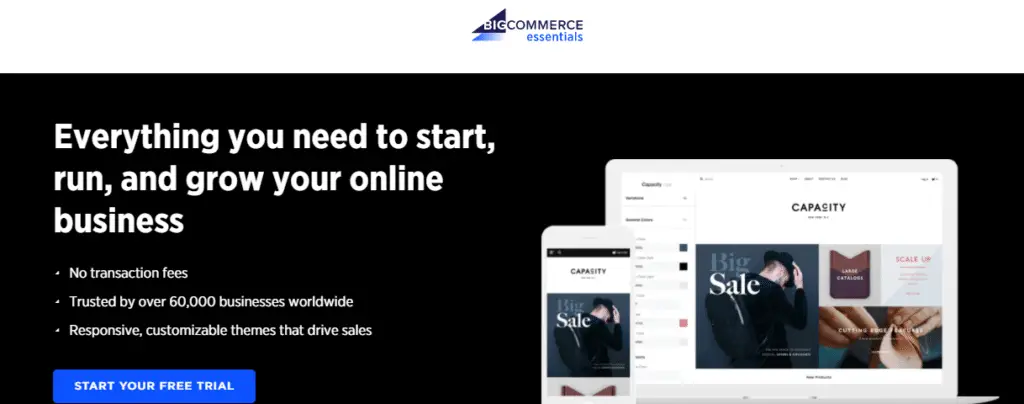
With over 5000 apps and design partners, it offers you most of the features you need to start, run, and grow your e-commerce business. Merchants on BigCommerce have made over $25 billion in sales. BigCommerce offers you beautiful themes that are fully customizable with inbuilt, CSS, HTML, and Javascript.
Some of the key features of BigCommerce are:
- Page Builder Visual Editor to edit pages on your site with the drag and drop editor.
- Customizable SEO URLs, Out of the box meta description, and robot.txt editing designed to help you drive organic traffic.
- Create multiple storefronts and switch between them with a single login.
- Analytics dashboard to monitor real-time important metrics such as customer’s data, orders placed and purchases made.
- BigCommerce integrates with some popular apps like Threekit, Route, Bolt, Mailchimp, QuickBooks Online, Back In Stock Product Alert, etc.
- Google’s AMP and Akamai image manage supported to ensure that your store pages load speedily.
- API and SDK server to server to customize the checkout experience of your customers.
1. Integration
Integration is a critical feature in any e-commerce platform and it is important we check it out for Shopify and BigCommerce.
No matter how powerful these e-commerce platforms are, you can’t scale your business to the desired level without the help of some of the important apps in e-commerce.
That’s why you need to integrate some apps into Shopify or BigCommerce depending on what you want to achieve.
Some of these apps are free to use while others are paid for. Let’s compare Shopify Vs BigCommerce in terms of integration below.
Shopify: Integration
Shopify is a giant when it comes to integration with apps. It has 2874 apps on its app store design for various functions. These apps are placed under simplified categories making it easy for you to identify the one you need.

Some of the apps that integrate with Shopify are as follows:
Simple WordPress Post Feed: If you plan to start a blog or already have a WordPress site or blog, Simple WordPress Post Feed is designed to help you display articles on your website on your Shopify store with just a click.
This will be perfect if your WordPress site is in line with the products you sell in your store. It is also a way of driving organic traffic to your store.
Onollo: As a merchant who wants to drive organic traffic to his store with social media marketing, then Onollo is an app you can integrate with your Shopify store.
It can be likened to social media management tools. The only difference is that it’s designed to boost organic traffic to the products in your store.
BUCKS Currency Converter PRO++: This app helps you boost your international sales. With it, you give your customers the privilege to make purchases in their various currencies and then convert it into your own set currency.
This app supports 160+ currencies and does not cost any fee to integrate into your store.
Fast Order: Some of your customers have a tight scale when it comes to shopping online. They just want to make buy things as quickly as possible. Fast Order is an app you can use to achieve it.
This saves them the time of searching endlessly for product categories and listing pages. With just a keyword on the store, Fast Order will automatically suggest products related to that keyword making it easy for customers to order as many products as possible in minutes.
Oberlo: One of the challenges some merchants on Shopify face is the ability to identify that winning product to sell.
This is common among beginners. Oberlo app takes care of such. It is more useful to drop shippers on Shopify who are on the lookout for trending products to sell on their store. Oberlo handles the packaging and shipping while you bother how to make sales.
Other apps that integrate with Shopify are Multichannel importer, Excelify, Printify, CustomCat, EU Cookie Bar GDPR, Terms and Conditions Checkbox, Salekit, Instant Search+ and Filters, Free Shipping Bar, SEO Booster, etc.
BigCommerce : Integration
BigCommerce too has a lot of apps it integrates with. Although there is no exact number of apps that connect with it, its powerful enterprise integrations are categorized for easy identification base on the need in your e-commerce store.
Some of the apps that integrate with BigCommerce are as follows:
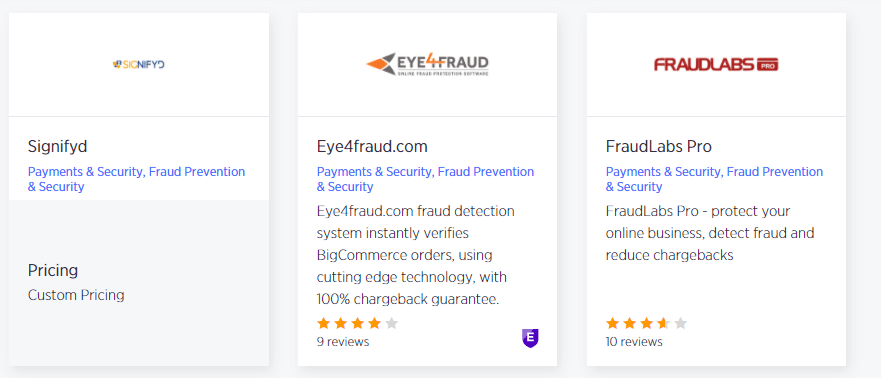
Fast: This is a one-click app that enhances the checkout experience of your customers. It works by connecting your PDP and cart pages.
This enables your customers to make a purchase on your store and check out with just a click. Another function of this app is that it allows your customers to see their transactions and also track their deliveries on a dashboard.
Smile.io: With this app, you can design a reward program for your customers. This could be a gift for a customer who visited and purchased from your store the first time.
The idea is to earn their loyalty and have them buy from your store subsequently.
FraudLab Pro: In as much as you look forward to making more sales, you must be conscious of fraudsters who want to scam you.
Not every person that browses your store has a sincere intention to make a purchase.
Some are looking for ways to defraud you. That’s what FraudLab Pro integrated into your store will help you check.
It’s a fraud prevention app that screens all the emails, credit cards, proxies, geolocations to ensure that any customer on your store doesn’t defraud you.
Sprocket Dropshipping: If you are looking for winning products in the United States and European Union, this tool will help you source them for your dropshipping business.
Drobile: Due to the increase in the use of smartphones, most of your customers are likely to shop on your store with their iOS and Android devices.
You will be missing a lot of sales if your BigCommerce store doesn’t respond perfectly to iOs and Android devices. Drobile is an app to help you achieve that.
With it, you can convert your BigCommerce store into an iOs and Android app. This makes it easy for your customers to browse and purchase from your store while on the go. You don’t need to write a single code to make this happen.
Drobile has an easy drag and drop system to help you achieve this.
Other apps that integrate with BigCommerce are Avalara, Xero, Price2Spy, Slemma, Order Desk, Jasper, Catalog Transfer, Facebook Shop, Trustpilot, Sellbrite, etc.
Verdict: Shopify wins
Both e-commerce platforms have a variety of apps they integrate with. But Shopify has more apps. It also integrates with more popular apps drop shippers and store owners need to scale their business which can be easily found in its app store.
2. Ease Of Use
Nowadays nobody wants software or application that is difficult to use. People want something they can easily explore without having any coding experience or being tech-savvy. So is true of e-commerce platforms.
The ability to run your e-commerce business on Shopify or BigCommerce easily should matter to you. That way you can handle a greater percentage of tasks yourself with no technical assistance.
Shopify: Ease Of Use
Shopify to me is the easiest e-commerce platform for a newbie in the e-commerce world. Even though it has powerful tools for merchants, you can still set up your store, add products, fulfill orders without the help of anyone.
When it comes to templates, it has awesome modern ones that you can customize to suit your e-commerce store.
I also see their back end as not confusing. Sometimes when I get stuck, I run to the video tutorial to get help.
BigCommerce: Ease Of Use
BigCommerce is also easy to use to some extent but I won’t recommend it to a beginner who doesn’t know anything about e-commerce.
It best suits merchants who have little experience in running an e-commerce store. For example, some beginners find it difficult to understand and apply the language of the editor thereby making it difficult for them to design their store themselves.
But it’s understandable why BigCommerce lags behind in this area. This is because it has some powerful in-built features which allow you to add products to your store and make changes at will.
These features sometimes become challenging for beginners to set up their online stores easily. However, it recently released a Store Design Tool in a bid to make it easy for beginners to build their online store with ease.
Verdict: Shopify Wins
Shopify is easier to use than BigCommerce. It is beginner-friendly and that places it ahead of BigCommerce which has inbuilt features that many newbies find hard to handle.
3. Dropshipping
Some of the merchants that want to launch their e-commerce business on Shopify or BigCommerce do so because of dropshipping.
They want to fulfill orders and get their commission. Shopify and BigCommerce are popular platforms for dropshipping. But we’ll check them out to see which is better in this case.
Shopify: Dropshipping
Dropshipping on Shopify just involves setting up your store, looking for a supplier anywhere around the world, or leveraging supplier database to source for Shopify app that connects you and your to store thousands of suppliers. Oberlo is one of the marketplaces to source suppliers.
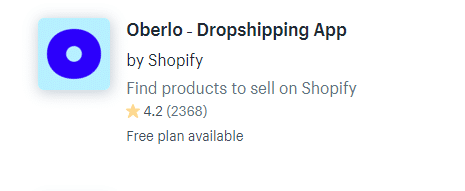
It is one of the dropshipping apps on the Shopify app which connects you with suppliers with just a click.
Dropshipping on Shopify appears to be preferable citing all the dropshipping apps on Shopify. It helps you source products, drive traffic to your store, receive orders, payments, and fulfill orders.
BigCommerce : Dropshipping
BigCommerce too is also a dropshipping platform where you can set up your store, source for products, get, and fulfill orders.
But it comes to apps and integrations which is the ultimate in dropshipping, Shopify has an edge over it.
For instance Shopify partners with the world’s leading marketplace – Oberlo, which is a gateway to sourcing for suppliers.
BigCommerce has decent marketing place apps like Modlyst, Inventory source which are not robust like Oberlo.
Verdict: Shopify Wins
Most people get frustrated and even ask if dropshipping is dead because they can’t fulfill others as they want.
Some of the reasons are that they lack the essential apps and integrations to scale their dropshipping business. Shopify has all the essential apps for dropshipping.
Its partnership with Oberlo places it above BigCommerce in this regard. Although BigCommerce doesn’t charge any transaction fee like Shopify, Shopify makes up for such lag with its Shopify payment which doesn’t charge merchants that use it.
4.Themes
Theme is the overall look of your online store. Be it on Shopify or BigCommerce, the layout, style element, and color scheme of your online store depends on the theme you choose.
In fact, the first thing that captures the attention of any customer who lands on your store is your theme.
That will decide if such customers will stay to browse products and place orders. That first impression matters and don’t make it a negative one for your first-time customers.
Shopify and BigCommerce boast of a variety of themes on their platform which you can use in your store.
Shopify: Themes
It has 73 different themes in its theme store. These themes come in a different style that responds perfectly to any device.
They have features that suit your store include search engine optimization, social media icons, free updates, free stock photos, etc. Shopify themes are designed and customizable to suit any niche of products you can deal on.

While a few of them are free to use, others require you to subscribe to them. Some of the free themes on Shopify are Boundless, Express, Debut, Venture, Supply, etc. While some of these themes may be free to use, they lack the advanced features and tools you need to scale your business.
That’s why it is advisable to go for premium themes that give you the advanced features and tools you need to scale your business. Debutify is one of the robust and advanced Shopify themes. It offers a free plan but to enjoy its advanced features, you need to upgrade to its premium version which also offers you a 14-day free trial. Here is my ultimate review of Debutify Shopify theme.
BigCommerce : Themes
There is no exact number of themes on BigCommerce theme store but it has quite awesome themes that are categorized according to different niches.
They are search engine optimized, have social icons, respond perfectly on any device, and possess other basic features a theme should have.

You can even view the demo of any you choose to be sure it will be a perfect match for your store. Also, some of its themes are free but bear in mind that you may not have the advanced features, tools, and add-ons you need to grow your store quickly.
Some of the themes on BigCommerce are Cornerstone Light, Fortune Bright, Orbit Light, Camdem Hardware, Pinnacle Impact, etc.
One thing I noticed on BigCommerce theme store is that its paid themes are more expensive than Shopify.
For instance, Out of the 64 paid themes on Shopify, none of them is above $200. But on BigCommerce, you have themes that cost $300.
Verdict: Shopify Wins
Both have a variety of awesome themes in their stores both free and paid. However, Shopify has less expensive themes compared to BigCommerce.
5. Uptime
It is frustrating to have an online store that is slow to load. An online store that doesn’t load at the expected speed is a total turn-off.
Imagine a customer wants to check out a product on your store only to discover that your store takes forever to load.
Or he is about to convert to sale only for your store to experience downtime. These can create a bad user experience even cost you sales. That’s why we need to check out the uptime of Shopify and BigCommerce.
Shopify : Uptime
Shopify claims it has 99.99% server uptime which makes it easy for your online store to be available to your customers 24/7. Its services are available in all regions around the globe. However, it occasionally experiences downtime due to errors from third-party apps.
BigCommerce: Uptime
BigCommerce also claims on its official website that it has 99.99% uptime. Which can be 100% during cyber week. To give you peace of mind, It has an app called Uptime Monitor which allows you to monitor uptime, downtime, and loads time of your store.
Verdict: It’s a tie
Both e-commerce platforms claims of same uptime which guarantees that your store will be up and running all the time.
6. Transaction Fees
As a store owner, it is important you bear in mind that you’re likely to pay transaction fees anytime you receive payment on your store. Some merchants see it as a cut on their sales.
These transaction fees are for the service payment gateways offer you, which is helping to process the payment on your store. Does Shopify or BigCommerce charge transaction fees? We will see below.
Shopify: Transaction Fees
Unfortunately, Shopify charges you a transaction fee if you use third-party payment gateways like Stripe, 2Checkout, Payfast, etc.
These fees depend on the Shopify plan you subscribed to. For Basic Shopify, it is 2%. Shopify and Advanced Shopify are 1% and 0.5% respectively.
However, Shopify has its payment gateway- Shopify Payment which doesn’t charge any amount for store owners that use it as a payment option.
But one thing I dislike about it is that is not available in every region.
Only store owners in countries like Spain, Canada, UK, Austria, Denmark, Germany, Hong Kong SAR China, Ireland, Italy, Japan, The Netherlands, New Zealand, Singapore, Sweden, can use it as a payment gateway.
BigCommerce : Transaction Fees
It’s interesting to know that BigCommerce doesn’t charge you any transaction fee for all its plans, unlike Shopify.
But have it in mind that your bank will charge little card fees. These fees go to companies that maintain those cards which your customers use in making payments.
They vary depending on the country you operate your store from and apply to Shopify and BigCommerce.
Verdict: BigCommerce wins
BigCommerce doesn’t charge transaction fees no matter your plan, unlike Shopify. This will limit the fee you pay when you receive payment to only the charges from credit card companies and banks.
7.Customer Support
The customer support these e-commerce platforms offer is worth comparing. This is because no matter how tech-savvy you’re, you will need the technical support from these platforms to fix any issue beyond your control.
Shopify: Customer Support
Shopify boasts of a support team that is available to support you 24/7. You can contact them via email, live chat, or phone.
It has a community you can join and get the perspective of other store owners. You also have access to webinars, video series, and ebooks that will help you grow your store.
BigCommerce: Customer Support
BigCommerce has a customer support team you can contact 24/7 through email, live chat, and phone. It has also a community where you have access to thousands of articles and videos that can help you fix issues ok your own.
Verdict: It’s a tie
Both e-commerce platforms offer the same kind of customer support. No one does more than the other.
8. Shopify Vs BigCommerce: Pricing Plans
Having reached this far, it is important we discuss the pricing plans of BigCommerce and Shopify. This is to prepare your mind on the amount you need to pay either monthly or yearly to be on these platforms.
Shopify: Pricing Plans
It has 5 pricing plan which is as follows:
- Shopify Lite – $9/month
- Basic Shopify – $29 per month
- Shopify – $79 per month
- Advanced Shopify – $299 per month
- Shopify Plus – negotiable
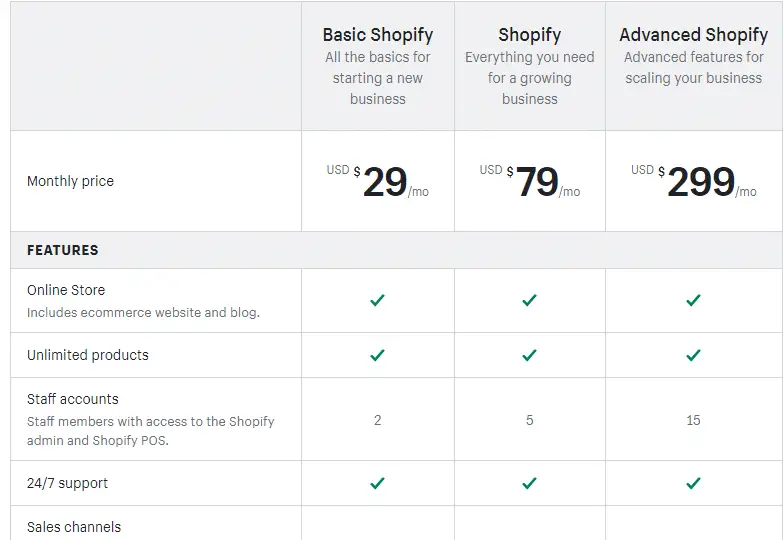

Note that these pricing plans come with different features. Shopify offers you a 10% discount on annual plans and a 20% discount on biennial plans.
BigCommerce: Pricing Plans
BigCommerce has 4 different pricing plans namely:
- Standard – $29.99/month
- Plus – $71.95/month
- Pro – $ 269.96/month
- Enterprise – Negotiable
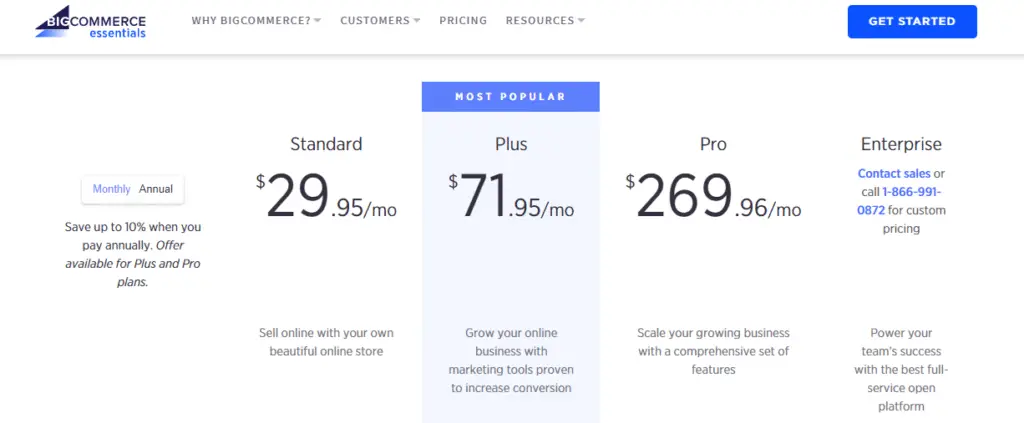
Note: These pricing plans come with different features. You also get a discount if you decide to pay yearly rather than monthly.
That’s it between Shopify and BigCommerce. I believe by now you have gotten the detailed information you need to make the best choice from the two base on your needs.
To make that decision-making process easier for you, I have collated some relevant information you may also like to consider before making your final decision. That’s is to check for the pros and cons of Shopify and BigCommerce.
Shopify: Pros
- It’s beginner-friendly
- Offers you a 14-day free trial
- 99.9% uptime server
- Comprehensive customer support
- Awesome themes to design your online store
- Design your store in 50 different languages
- Robust payment method
- Unlimited bandwidth
- You can optimize your store for SEO traffic through blogging and product description
- Integrates with your favorite apps to scale your business
- Has advanced e-commerce tools
- Sell any kind of product you want
- Best suited for dropshipping
Shopify: Cons
- Charges transaction fees if you don’t use Shopify Payment
- Advanced tools you need are not free. They add to your monthly fee.
- Customers cannot use multiple discounts. Only a discount per order is allowed by default.
BigCommerce: Pros
- Offers 15-day free trial
- Doesn’t charge any transaction fee
- Has beautiful themes from its theme store to design your store
- 99.99% uptime. Could be 100 during cyber week.
- Integrates with a lot of apps you need to scale your e-commerce business
- Offers superb customer support
- Has advanced features for e-commerce business
- Good for dropshipping
- You can sell any kind of product
- It has an in-built blog which you can use to create a post that will drive organic traffic to your store.
BigCommerce: Cons
- Not entirely beginner-friendly. Its editor language can be confusing for newbies who have no prior knowledge of e-commerce.
- Themes on its store are bit expensive
- No lite version like Shopify. This means that you can’t integrate it with your existing website. Or use it to build an online store elsewhere.
Conclusion
Shopify and BigCommerce are two robust e-commerce platforms where you can set up your online store as a merchant.
It is important you evaluate properly the comparisons we made in this guide against your requirements. This will help you make an informed decision.
If I’m to make a choice, I will go with Shopify. Here’s why: Shopify is so beginner-friendly that even a newbie in e-commerce can set up a store and manage it without any assistance.
It has more advanced apps and features to run a full-fledged e-commerce business though the additional costs are there.
In addition, it is a force to reckon with when it comes to dropshipping. In all, it has all you want in an e-commerce platform and the scalability is there.
However, the final decision to settle for any is yours. Place side by side what you look for in an e-commerce platform with the comparisons made here.
That will give you a clear view of what you want and also help you make the best choice. Finally, go first with the free trial of any of these platforms you choose to be sure it’s really what you need.


![How To Start An E-commerce Business [Beginner’s Guide]](https://www.depreneurdigest.com/wp-content/uploads/2020/10/roberto-cortese-ejhjSZKTeeg-unsplash-2-1-150x150.jpg)